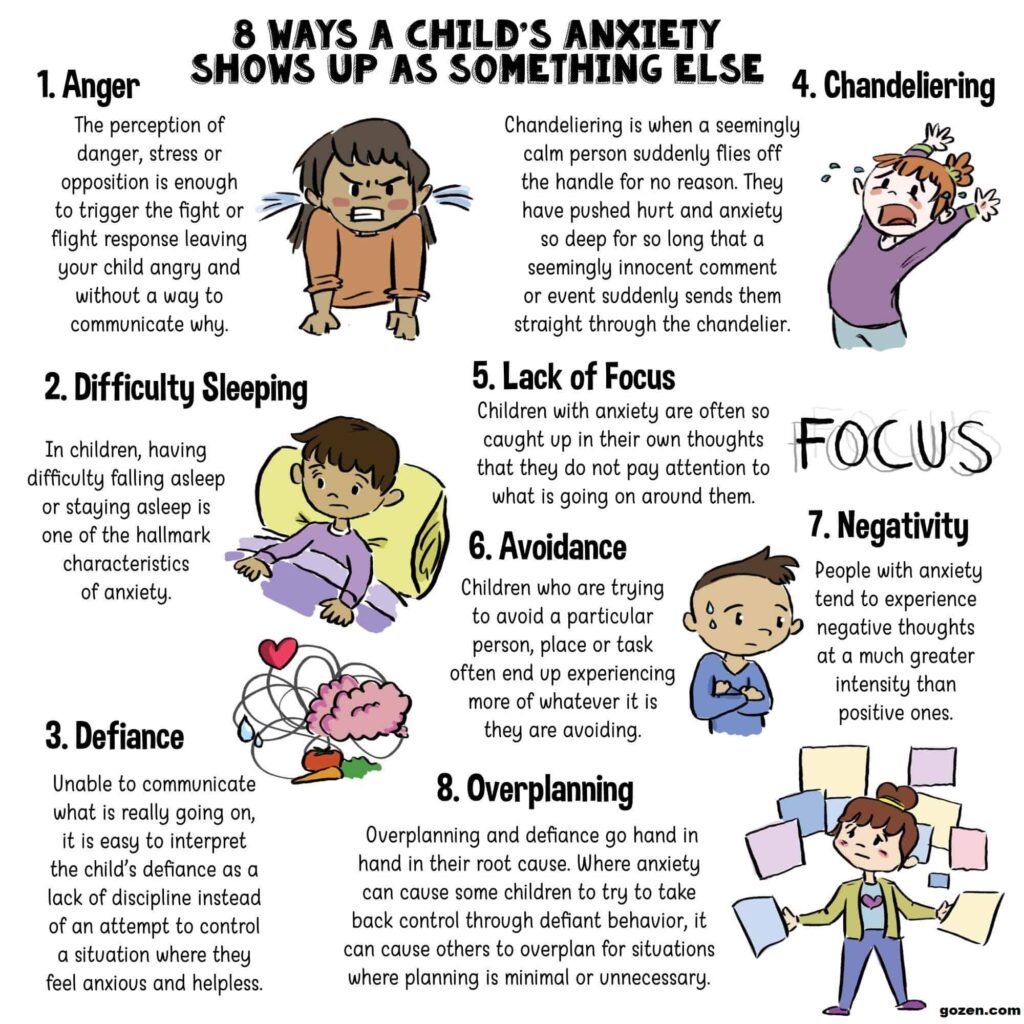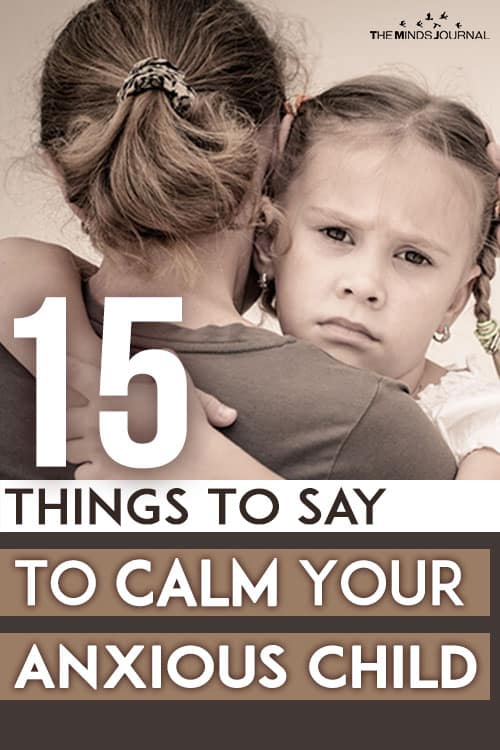Anxiety is one of the most common mental illnesses plaguing society right now. Unfortunately, anxiety in children in recent times is at an all-time high. Parents sometimes fail to understand what their children are going through, due to the belief that since they are young, they don’t have much to worry about. But that is where they are wrong.
Immense peer pressure and academic pressure can take a heavy toll on children, and this leads to them suffering from anxiety. Being a parent is an incredibly tough and challenging job, and getting to understand each and every aspect of parenting is quite intimidating. But when it comes to anxiety in children, as a parent, you need to do everything in your power to help them with it.
A few simple words can relieve your child’s angst, worries.
As a parent, you want to take away your child’s worries and shield them from pain. The problem is that you can’t. Life teaches them about life.
Younger kids might be afraid of being away from caregivers, bumps in the night, needles, or missing the goal net. In a study of kids aged 9 to 13, 86% of them said they worried a lot about the health of someone they loved. Worries about their future and school also topped the list.
The teen years produce its own set of anxieties. “Will so-and-so like me?” “Will I make a fool of myself?” “Will I get the grades I need to get into college?” “Am I beautiful enough, talented enough, smart enough, lucky enough to get what I want?”
Not all worry is bad. A certain amount of it has a purpose: to motivate you to act or to avoid danger. Fear becomes problematic when it becomes a child’s mode of operating, and it sets in before they’re able to solve their issue. It can evolve into an anxiety disorder, which interferes with your child’s ability to function.
Your job as a parent is to prepare your child for adulthood and all of the expectations that come with living in society. Effective parenting means creating positive beliefs and building self-efficacy. Your role isn’t to eliminate their anxiety; it’s to help them learn how to manage it.
You’ve probably figured out by now that reassurances don’t work. Statements like, “Everything will be okay,” “calm down,” and “stop worrying” fall on deaf ears. When someone is in a state of anxiety, their emotional brain has taken over, and the rational mind can’t process your advice. Your child’s anxiety is likely to rachet up a notch, which only becomes more frustrating and stressful for you.
Connecting with your child on a more emotional level is likely to generate a better result because the emotional part of the brain has already been engaged by the intense fear and worry.

What you can do to relieve your child’s worries
While a pat on the back and “you’ve got this!” can be affirming, it’s not likely to shift a child’s thinking patterns during a crisis or calm them down physiologically. But, there are other things you can say to your child to make them feel less stressed and more confident about tackling anything that comes their way.
Say these things to relieve your child’s worries:
Here are 15 calming things you can say to your child to relieve their anxieties and worries:
1. “I get it. You’re scared.”
Don’t be afraid to name what’s going on. Dr. Daniel Seigal says that when you name your emotions, it jump-starts your executive brain. He reveals, “you’ll have a greater capacity to choose your response at the moment.” By putting a label on their emotions, your child can either agree with you or tell you what they are really feeling, so you can both deal with that problem head-on.
2. “I know this is hard.”
Worry is hard, so tell your child that you understand. By mirroring their feelings, they’ll be more likely to connect with you and open up. You’re also validating them, and telling them it’s ok to feel what they’re feeling.
“When everything seems to be going against you, remember that the airplane takes off against the wind, not with it.” – Henry Ford
3. “Would you like a hug?”
Hugs have many benefits! Physical contact can stimulate the release of oxytocin, the feel-good hormone, and decrease the production of cortisol, the stress hormone. Your child will feel more relaxed and more able to think more rationally about their situation.
4. “Take a deep breath.”
Teaching your kids to breathe during a stressful situation is one of the most useful things you can do. Suggest they put their left hand on their tummy and their right hand over their heart, then breathe in and out slowly, noticing their belly expand and their chest rise and fall with each breath. It will ground them and change their physiological state. It’s a skill they can use anywhere from in the classroom before a test, or another other time anxiety creeps upon them.
5. “Go to your happy place.”
When your child is less stressed, ask them about a place that makes them feel good – calm, confident, and happy. It could be a beach, cottage, or cozy bedroom. Get them to describe it in perfect detail, including what it looks like, sounds like, smells like, and feels like to them. Then, when they become anxious, suggest they transport themselves to that happy place and let the power of visualization transform them.
“Don’t believe every worried thought you have. Worried thoughts are notoriously inaccurate.” – Renee Jain
6. “Let’s sing!”
Studies show that singing reduces stress and makes you happier. So, start up the chorus to your child’s favourite song, or get them up to dance to it. In less than a minute, the endorphins will kick in, and you’ll have interrupted the stress response long enough for the rational brain to kick in. As a plus, you will have shared a sweet bonding moment!
7. “Tell me more.”
To turn down your child’s emotional brain, get them talking about what’s stressing them out. If you ask questions, stick to opened ones, but simply allowing them the space to share can often do the trick. You will be showing them how much you’re interested in their experience and engaging their rational brain at the same time – which will help them to reframe the entire anxiety-provoking situation.
Anxiety in children
8. “What’s your heart telling you? What’s your brain telling you?”
These questions encourage your child to reflect on their emotions and to collect evidence about the situation. Their heart might be telling them that they are scared of failing the test, but their brain might be telling them that they’ve studied. Teach them that both can be true, and that’s ok and that they can challenge themselves as to which will win out: fear or facts. This is the essence of self-talk.
9. “What’s the worst that could happen?”
Asking, “What’s the worst that could happen?” helps kids put worries into perspective, and make big problems seem much smaller. The worst that could happen might be not making the soccer team. How bad would that be? What could your child do if that happens? What could they learn from that experience? Your child will see that they have the ability to overcome challenges and make the best of an undesirable situation.
10. “What would ______ (your hero) do in this situation?”
Everybody has someone they look up to – whether that’s a mentor or superhero. Ask your child how Spider-Man or Wonder Woman would handle their situation or real-life idols like Prince Harry or Taylor Swift. Then ask them how they can do the same.
“You’re braver than you believe and stronger than you seem, and smarter than you think.” – Christopher Robin
11. “Do your best.”
Kids need to know that perfection doesn’t exist; it’s an illusion. Effort matters. All you want for your kids is that they do their best and be their best.
12. “What would you rather feel?”
It can be so empowering for kids to learn that they can choose their feelings. When my daughter became extremely anxious about going for a blood test, she repeated over and over that she was scared. I asked her how she would like to feel instead, and she responded, “brave!” I told her she was already brave. “Say it,” I encouraged her. “I am brave,” she proclaimed. It worked!
13. “This feeling is going to pass. Remember when you _______?”
It’s easy for kids to get overwhelmed by their emotions and think that their anxious feelings will never go away.
Remind your child when they were able to overcome difficulties in the past, and that they can repeat their success again. Let them know how proud you are of their courage, then and now.
14. “How can I help you the most?”
Ultimately, your child knows best what they need from you, so ask them. They might stop for a minute, perplexed by your question, but if given a chance to think about it, they’ll tell you. They might say, “Hold my hand” or “Just sit with me for a minute while I calm down.” Either way, the solution will be tailor-made.
“Smile, breathe, and go slowly.” – Thich Nhat Hanh
15. “I love you.”
Telling your child how you feel about them is like covering them with a warm, safe blanket. It will soothe their worries and know that no matter what happens, your love will protect them.
Armed with these things to say, you’ll be in a better position to calm down your anxious child and get them feeling good about themselves once again.
In the end, though, if you want healthy and happy kids who worry less, the best you can do for your child is to work on your own calm. No matter what you say, you’re a walking example of how to stop worry in its tracks and how to resiliently lead your life.
Anxiety in children is something that should never be taken lightly. Making statements like “Relax, it will pass” is a strict no-no, and can have a severe impact on your child’s psyche. The best way to handle such a challenge is to take one step at a time, and trust the process and most importantly, trust yourself. As long as you are trusting yourself and your abilities, your child will feel safe, protected and at ease.
Here is an educational video regarding this topic:
You May Also Like:
- Advice On Dealing With Toddler Separation Anxiety
- The Biggest Cause Of Anxiety
- 4 Most Common Symptoms Of Depression In Children
- 7 Things You Need To Teach Your Children About Love And Life
- Anxiety Disorders Typically Caused By Exposure To Narcissistic Abuse










Leave a Reply